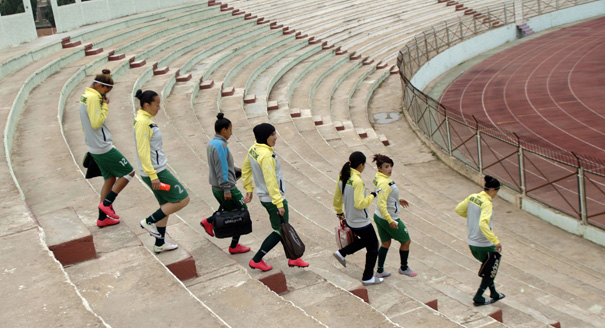Mustaqbal Misr has expanded its portfolio with remarkable speed, but a lack of transparency remains.
Yezid Sayigh
{
"authors": [
"Dalia Ghanem"
],
"type": "commentary",
"blog": "Diwan",
"centerAffiliationAll": "",
"centers": [
"Carnegie Endowment for International Peace",
"Malcolm H. Kerr Carnegie Middle East Center"
],
"collections": [],
"englishNewsletterAll": "",
"nonEnglishNewsletterAll": "",
"primaryCenter": "Malcolm H. Kerr Carnegie Middle East Center",
"programAffiliation": "",
"programs": [
"Middle East"
],
"projects": [],
"regions": [
"Maghreb",
"North Africa",
"Algeria"
],
"topics": [
"Political Reform"
]
}
Source: Getty
Algerian females have access to public space, but in controlled, restricted, and conditional ways.
Last month, a female jogger in Algeria was assaulted during her afternoon run. The woman was attacked by a man for being out during Ramadan. “Why are you here? Your place is in the kitchen,” he reportedly told her.
When the woman went to the gendarmerie to file a complaint, a member of the security forces also asked her: “And you then? Why did you go jogging at this time of day?” The video of her sobbing as a response to her treatment went viral and the idea of a “solidarity jogging event” was launched on social media. Between 300 and 500 Algerian women participated in order to affirm their right of access to public space.
A few days after that attack, a nine-year-old girl was assaulted by a man on a beach. When filing her complaint, the mother of the victim was blamed by members of the gendarmerie for going to the beach “without her husband.”
These two cases, among so many, confirmed that the presence of women in public spaces without a male can still be considered wrong in Algeria. While women have access to public spaces, often they do not participate in them, but only cross them. Such access remains controlled, restricted, and conditional, having to be justified in one way or another. Education or work is seen as a legitimate reason for women to go out into the city, whereas jogging or going to the beach still invites reactions of intolerance.
Algerian family law—established in 1984 and amended in 2005—embodies the unequal status of women. According to the law, women require male approval to get married, which is usually provided by a father or brother. The family code is the legal expression of a patriarchal ideology that survives in Algeria. It is also proof of the resilience of a system that prevents women from even becoming full-fledged members of their own family. While officials regularly make speeches about gender equality and the state is proud of having the highest number of women in parliament in the Arab world, it has also legalized inequality in society. By regulating women’s role inside the home, the state regulates it outside as well.
Yet modernization, urbanization, education, and access to the workplace, which followed independence in 1962, have also profoundly affected gender relations in the country. In that regard, female access to education was the most crucial factor. In 2016, the net primary school enrollment rate stood at 97.2 percent for girls against 98.5 percent for boys. From the secondary school level onward, the number of females is much higher than that of males. This phenomenon is also evident in universities, where females outnumber males, as their success rate in the Baccalaureate exam is much higher—65 percent for females compared to 35 percent for males in 2017.
As a consequence of such developments, women have improved their access to the workplace. Some 1.9 million were employed in 2016, against 1.14 million a decade earlier. Nevertheless, their presence in the labor market remains modest, as women made up 17.6 percent of the workforce in 2016.
The greater access females have to education and work, as well as growing urbanization, have all facilitated their entry into public spaces. However, it does not mean that women are fully integrated into them. Many places, such as stadiums and coffee shops, remain predominantly male. Indeed, outings by females frequently need to be justified according to the traditional norms and principles of family and society. Public space is gendered and men remain its masters. Men can come and go at all times of the day and night, or simply loiter, while women are expected to perform meaningful actions—pick up the children from school, go to the market, or attend meetings.
This has imposed behavioral changes in women. Through their ability to create an appearance of purpose in public spaces, women demonstrate respectability and can therefore claim a certain degree of safety. This respectability can be produced by avoiding any transgression of defined boundaries—for example, smoking in public spaces constitutes a major taboo—easing women’s feelings of being out of place. From a very young age, females are taught to be “modest,” while boys are allowed, even encouraged, to explore the world outside. Especially during adolescence, the spatial boundaries of females are reduced, and as they grow older their access to public space becomes more restricted. Females come to internalize concepts of femininity, which determine what respectability is and is not, until they develop an unconscious ability to police themselves.
For Algerian women public space remains a dangerous space in which interactions carry a latent threat of violence. The violence can be physical, but need not be, and it produces a constant sense of discomfort. Women may be stared at, verbally abused, stalked, groped, or sexually assaulted. As a result, they have developed avoidance tactics to cope with these situations and produce some sense of ease in places where they might, otherwise, have felt the contrary.
As Aliya, a 32-year-old mother of two, explained: “You cannot avoid it. The minute I open my closet in the morning I start thinking: What color? What clothes? Which shoes? You are constantly avoiding [men], their disgusting gaze and comments. Sometimes I am so exhausted by this continual harassment in the street that I don’t want to leave the house.”
These avoidance tactics—wittily described by two female poets in an engaging video—include choosing one’s itinerary carefully, wearing sunglasses to avoid eye contact, listening to music so as not to hear any lewd comments, wearing loose clothing, avoiding flashy colors, and avoiding walking alone as doing so can be an aggravating factor. All this has very real consequences on women’s mobility and freedom of movement.
Algeria’s patriarchal system is being sustained by the creation of public spaces in which women are made to feel that their presence is an anomaly. But it goes beyond that. The resilience of the country’s patriarchal reflexes—which also happen to be those of a political elite both too old and too male-dominated that greatly defines social and political life—is also hindering Algerian women’s full access to their individuality, therefore denying them their rights as citizens.
Carnegie does not take institutional positions on public policy issues; the views represented herein are those of the author(s) and do not necessarily reflect the views of Carnegie, its staff, or its trustees.
Mustaqbal Misr has expanded its portfolio with remarkable speed, but a lack of transparency remains.

Yezid Sayigh
The burden of environmental degradation is felt not only through physical labor but also emotional and social loss.

Yasmine Zarhloule, Ella Williams
The country’s youthful protest movement is seeking economic improvement, social justice, and just a little hope.

Yasmine Zarhloule
The Moroccan-Algerian rivalry is playing itself out in ties with Burkina Faso, Niger, and Mali.

Yasmine Zarhloule
In an interview, Yasmine Zarhloule discusses irregular migration to Europe and the shortcomings of a securitization policy.
Rayyan Al-Shawaf